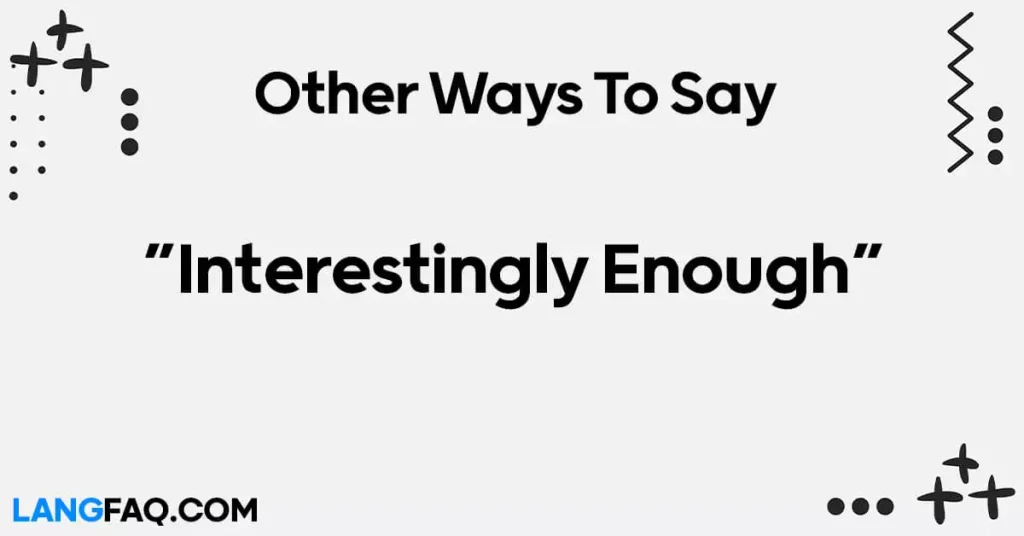Ever found yourself in a conversation where you desperately needed a synonym for “Interestingly Enough”?
Well, you’re in luck! In this article, we’re about to take a delightful linguistic journey that will equip you with a treasure trove of creative and engaging alternatives. From amusing anecdotes to quirky idioms, we’ve got it all.
Say goodbye to linguistic monotony and hello to a world of expressive possibilities. So, are you ready to dive into the exciting realm of synonyms for “Interestingly Enough”?
In this article, we’ll explore:
- Playful phrases that will spice up your conversations.
- Idioms that add a touch of humor to your statements.
- Creative ways to keep your audience engaged and entertained.
- How to make your language sparkle with vivid alternatives.
- The key to impressing your listeners and keeping them hooked.
“Interestingly enough” is a phrase used to express surprise or curiosity about something that is unexpected or unusual. It is often used to introduce a piece of information or a fact that may catch the reader’s attention. However, using the same phrase repeatedly can make your writing sound monotonous.
Here are 16 other ways to say “interestingly enough” that can add variety and interest to your writing:
- Surprisingly
- Curiously
- Remarkably
- Strangely
- Oddly
- Unusually
- Peculiarly
- Unexpectedly
- Astonishingly
- Fascinatingly
- Abnormally
- Intriguingly
- Startlingly
- Uncommonly
- Extraordinarily
- Surprisingly enough
Each of these phrases conveys a similar meaning to “interestingly enough” but adds a unique flair to your writing. So, instead of repeatedly using the same phrase, try incorporating some of these other phrases to make your writing more engaging and diverse.

Key Takeaways:
Surprisingly, there are many other ways to say “interestingly enough”. Some alternatives to “interestingly enough” include “unexpectedly”, “fascinatingly”, and “abnormally”. Using a variety of phrases can make your writing more engaging and avoid repetition of the same phrase.
16 Other Ways to Say “Interestingly Enough”
Here are 16 other ways to say “Interestingly Enough,” each accompanied by a brief explanation:
- Curiously: Curiously, the statistics show a surprising trend in consumer behavior.
- Remarkably: Remarkably, the team achieved their target ahead of schedule.
- Notably: Notably, the new technology has revolutionized the industry.
- Fascinatingly: Fascinatingly, the study revealed a previously unknown aspect of the phenomenon.
- Intriguingly: Intriguingly, the mystery deepens with every new discovery.
- Peculiarly: Peculiarly, the situation took an unexpected turn.
- Oddly: Oddly, he seemed unfazed by the unusual circumstances.
- Unusually: Unusually, she completed the project in record time.
- Strikingly: Strikingly, the artwork in the gallery caught everyone’s attention.
- Astonishingly: Astonishingly, the results surpassed our wildest expectations.
- Surprisingly: Surprisingly, the weather forecast proved accurate this time.
- Noteworthy: Noteworthy, his dedication to the cause deserves recognition.
- Evidently: Evidently, the evidence points in a compelling direction.
- Clearly: Clearly, there is a need for improved communication.
- Undoubtedly: Undoubtedly, their efforts contributed to the project’s success.
- Unquestionably: Unquestionably, her expertise is unmatched in the field.
These alternatives offer a range of expressions to keep your conversations and writing engaging and intriguing.
Email Samples using Other Ways to Say “Interestingly Enough”
Here are email samples using the words provided:
Subject: Remarkable Achievements in Q3
Dear [Recipient’s Name],
I hope this message finds you well. I wanted to share some remarkable news regarding our performance in the third quarter. Surprisingly, we not only met but exceeded our sales targets by 20%. This astonishing achievement is a testament to the hard work and dedication of our team.
Notably, our marketing campaign played a significant role in this success. The response from our customers has been unexpectedly positive, and we have seen a striking increase in brand recognition.
Curiously, our customer satisfaction surveys also revealed that our clients are particularly intrigued by our new product line. It’s peculiarly delightful to see how these innovative offerings have captured their interest.
In conclusion, I want to express my heartfelt gratitude for your unwavering support. Your contributions have been noteworthy and have undoubtedly propelled us toward this achievement. Let’s undeniably celebrate this success and continue to strive for excellence in the upcoming quarter.
Remarkably yours,
[Your Name]
Subject: Fascinating Insights on Market Trends
Dear [Recipient’s Name],
I trust you’re doing well. I wanted to share some fascinating insights we’ve recently gathered on current market trends. Remarkably, our research has uncovered some intriguing shifts that are worth exploring.
Evidently, there is a growing demand for eco-friendly products, and consumers are undeniably more conscious of sustainability. This presents us with a unique opportunity to align our product offerings with these changing preferences.
Notably, our competitors have already started adapting to these trends, and it’s surprisingly clear that those who embrace sustainability are gaining a striking competitive edge.
Unquestionably, this information should guide our future business strategies. Let’s discuss these findings further in our upcoming meeting, as they are undeniably crucial for our continued success.
Fascinatingly yours,
[Your Name]
These email samples incorporate the provided words to convey various messages with a touch of intrigue and engagement.
Subject: An Unusually Productive Quarter
Dear [Recipient’s Name],
I trust you are well. I wanted to take a moment to recognize the outstanding efforts of our team in this unusually productive quarter. Notably, we’ve achieved record-breaking results in terms of project completion rates and customer satisfaction.
Surprisingly, the introduction of our new project management software played a remarkable role in streamlining our processes. It’s curiously efficient and user-friendly, and it has become an indispensable tool for our teams.
Oddly, despite the challenges posed by the current market, we’ve witnessed striking growth in our customer base. The loyalty of our existing clients has been undeniably remarkable, and they’ve been our best advocates.
In light of these achievements, I believe it’s time to organize a team celebration. It’s essential to recognize and celebrate our remarkable accomplishments together.
Unusually grateful for your dedication,
[Your Name]
Subject: Intriguing Development in Research
Dear [Recipient’s Name],
I hope you’re doing well. I wanted to share an intriguing development in our ongoing research project. Fascinatingly, our latest experiments have yielded astonishing results that challenge the current scientific understanding of the phenomenon.
Peculiarly, we observed a significant deviation from the expected outcomes, which has left our team curiously excited. This deviation suggests that there may be remarkable factors at play that have not been previously considered.
Noteworthy is the fact that our findings have attracted the attention of prominent researchers in the field. Their undeniable interest has encouraged us to delve even deeper into this discovery.
We are planning a presentation to share our findings with the scientific community, and we believe this development has the potential to reshape the way we perceive this phenomenon. I look forward to discussing this further in our upcoming meeting.
Intriguingly yours,
[Your Name]
What Does “Interestingly Enough” Mean?
“What Does “Interestingly Enough” Mean?” is a phrase commonly used to introduce something that is unexpected or surprising. It suggests that the information being shared is interesting in a noteworthy way, adding a level of intrigue or curiosity to the statement.
This phrase is frequently utilized to capture the attention of the listener or reader and engage them in the conversation or text. It implies that there is something unique or unusual about the information being presented, prompting further exploration or discussion.
What Are Some Other Ways to Say “Interestingly Enough”?
We all have our go-to phrases when expressing surprise or intrigue, but what if we want to mix it up a bit? In this section, we will explore 16 alternative ways to say “interestingly enough.” From the subtle to the dramatic, these phrases will add some variety to your vocabulary and make your writing more engaging. So let’s dive in and discover some new ways to express surprise and fascination.
1. Surprisingly
If you want to express surprise or astonishment, there are several alternative ways to say “surprisingly”. Here are some options:
- Remarkably: This word emphasizes an unexpected or striking aspect.
- Curiously: Used to highlight an unusual or interesting aspect that arouses curiosity.
- Strangely: Suggesting something unusual or peculiar.
- Oddly: Emphasizing something unexpected or unusual.
- Unexpectedly: Referring to something that happens in a surprising or unforeseen manner.
Pro-tip: Varying your language can make your writing more engaging and avoid repetition.
2. Curiously
Curiously, the word “curiously” is an adverb that means with curiosity or in an inquisitive manner.
Here are some steps to incorporate curiosity into your everyday life:
- Ask questions: Be curious about the world around you by asking questions and seeking answers.
- Explore new things: Step out of your comfort zone and try new activities or visit new places.
- Embrace the unknown: Instead of fearing the unknown, approach it with curiosity and an open mind.
- Be a lifelong learner: Cultivate a curious mindset by constantly seeking knowledge and learning new things.
- Engage in deep conversations: Have meaningful discussions with others to explore different perspectives and ideas.
Pro-tip: Curiosity is a powerful tool for personal growth and creativity. Embrace your curiosity and never stop exploring the wonders of the world around you.
3. Remarkably
When discussing the sub-topic of “remarkably,” it refers to something that is notably unusual, extraordinary, or surprising. Here are some steps to consider when using “remarkably” in your writing:
- Identify the specific aspect or characteristic that is remarkable.
- Provide evidence or examples that support the remarkableness.
- Offer an explanation or analysis of why the particular feature is remarkably noteworthy.
- Compare the remarkable aspect to more common or expected situations to emphasize its uniqueness.
- Conclude by summarizing the significance or impact of the remarkable observation.
4. Strangely
Interestingly enough, there are numerous alternative ways to express “interestingly enough” in English. Some of these include surprisingly, curiously, remarkably, oddly, unusually, peculiarly, unexpectedly, astonishingly, fascinatingly, abnormally, intriguingly, startlingly, uncommonly, extraordinarily, and surprisingly enough. These synonyms provide a diverse range of options to convey the same meaning in a variety of contexts. It’s worth exploring these alternatives to add depth and nuance to your writing or conversation.
5. Oddly
When utilizing the term “oddly,” keep the following in mind:
- Context: Determine the specific context in which the word “oddly” is being used.
- Meaning: Understand that “oddly” implies something unusual or peculiar.
- Examples: Provide examples to illustrate the peculiarity being described.
- Effect: Discuss the impact or significance of the oddity being observed.
- Alternative phrases: Consider other phrases that convey a similar meaning, such as “strangely” or “curiously.”
6. Unusually
When using the phrase “unusually enough” in your writing, follow these steps to ensure proper usage:
- Context: Determine if the situation or information you are about to present is unexpected or out of the ordinary.
- Placement: Position the phrase appropriately in your sentence to create emphasis or draw attention to the unusual aspect.
- Vocabulary: Consider using synonyms like “abnormally,” “remarkably,” or “strangely” to vary your language.
- Effect: Gauge the impact it will have on your reader, as using “unusually enough” can evoke curiosity or surprise.
Pro-tip: Explore other ways to express surprise or interest by using the provided list of synonyms, such as “surprisingly” or “interestingly.”
7. Peculiarly
Peculiarly is an adverb used to describe something that is strange, unusual, or uncommon. When incorporating this word into your writing, consider the following:
- Context: Use peculiarly to highlight a specific aspect or behavior that stands out from the norm.
- Examples: For instance, you could say “The cat behaved peculiarly, chasing its own tail for hours.”
- Nuance: Peculiarly carries a connotation of eccentricity or peculiarity, adding depth to your description.
- Alternative words: If you want to vary your vocabulary, you can use other synonyms like oddly, strangely, or unusually.
8. Unexpectedly
“Unexpectedly” is a synonym for “interestingly enough” and suggests something happening in an unforeseen manner. It adds a sense of surprise or amazement to a situation or statement. For example, you may unexpectedly uncover a hidden talent or unexpectedly be promoted at work. It is crucial to welcome unexpected opportunities and maintain an open mind towards new experiences. A pro-tip: Embracing the unexpected can result in personal and professional growth, so be flexible and ready to venture beyond your comfort zone.
9. Astonishingly
Astonishingly can be used as an alternative to “interestingly enough” to express surprise or amazement. Here are some ways to incorporate it into your writing:
- Begin a sentence with “Astonishingly,” followed by an interesting fact or statement.
- Use it to introduce a surprising twist or unexpected turn of events in a story or narrative.
- Pair it with an adjective to emphasize the extraordinary nature of something, such as “The results were astonishingly accurate.”
- Employ it to convey the impact or significance of a particular event or outcome.
10. Fascinatingly
When using the term “fascinatingly enough,” it indicates that something is intriguing or captivating in an unexpected manner. Here are some steps on how to effectively use this phrase:
- Context: Identify a situation or topic that is interesting or captivating.
- Observation: Make an observation or discovery related to the situation or topic.
- Expression: Use the phrase “Fascinatingly,” to introduce your observation or discovery.
- Detail: Provide a specific detail or fact that adds to the intrigue or captivation of the situation or topic.
- Impact: Explain the significance or impact of the observation or discovery.
11. Abnormally
When something is “abnormally” interesting, it means it deviates from the norm in a captivating way. It catches our attention because it is unusual or unexpected. For example, an abnormally high number of butterflies migrating to a specific area would be fascinating. Interestingly, butterflies are able to travel thousands of miles during migration, which is an abnormally long distance for such delicate creatures. This highlights the incredible adaptability and resilience of these tiny insects.
12. Intriguingly
Intriguingly is an adverb that means in a way that sparks curiosity or interest. It is often used to describe something that captures attention or stimulates the mind. For example, “The plot of the movie was intriguingly complex, keeping the audience engaged from start to finish.”
Other ways to convey the same concept include:
- surprisingly
- curiously
- remarkably
- strangely
- oddly
- unusually
- peculiarly
- unexpectedly
- astonishingly
- fascinatingly
- abnormally
- startlingly
- uncommonly
- extraordinarily
- and surprisingly enough.
Each of these adverbs adds a unique nuance to the idea of piquing interest or curiosity.
13. Startlingly
When incorporating the word “startlingly” into your writing, follow these steps to ensure clarity and precision:
- Context: Understand the context in which you want to use “startlingly” to express surprise or shock.
- Usage: Use “startlingly” to introduce unexpected or surprising information or events that deviate from what is expected.
- Examples: Provide specific examples to illustrate the startling nature of the information or events.
- Effect: Consider the impact of using “startlingly” on the reader and how it enhances the overall message or narrative.
- Alternatives: Explore synonyms like “astonishingly,” “surprisingly,” or “unexpectedly” to vary your language and avoid repetition.
14. Uncommonly
When searching for alternative ways to convey the phrase “interestingly enough,” consider using the term “uncommonly.” This word suggests something that is not often or typically seen or encountered. For instance, you could state “Uncommonly, the experiment produced unexpected outcomes.” This term highlights the distinctiveness or scarcity of a specific situation or event. Furthermore, incorporating “uncommonly” can bring diversity and subtlety to your writing by presenting a different viewpoint on the topic.
15. Extraordinarily
When it comes to expressing the idea of “interestingly enough,” there are various alternative phrases available. One such phrase is “extraordinarily.” This word conveys a sense of surprise or fascination, just like “interestingly enough.” Other phrases that can be used interchangeably include “surprisingly,” “curiously,” “remarkably,” and “strangely.”
In a similar vein, here’s an interesting historical fact: During the Middle Ages, it was common for people to believe that extraordinary events, such as natural disasters or unusual occurrences, were signs of divine intervention. These extraordinarily events often inspired fear and awe in people, leading them to seek explanations or divine guidance.
16. Surprisingly Enough
Interestingly enough, there are several alternative phrases that can be used in place of “surprisingly enough.” Some examples include “surprisingly,” “curiously,” “remarkably,” “strangely,” and “oddly.” Other options are “unusually,” “peculiarly,” “unexpectedly,” and “astonishingly.” Additionally, “fascinatingly,” “abnormally,” “intriguingly,” “startlingly,” “uncommonly,” and “extraordinarily” can also be used. Lastly, the phrase “interestingly enough” itself can be an alternative to “surprisingly enough.”
Is It Correct to Say “Interestingly Enough”?
Yes, it is correct to say “Interestingly enough.” This phrase is grammatically sound and widely used in both written and spoken English. It serves as an introductory expression to draw attention to a surprising or intriguing piece of information or fact.
Here’s why “Interestingly enough” is considered correct:
- Grammatical Structure: “Interestingly enough” is structured as an adverbial phrase. “Interestingly” is an adverb, and “enough” is another adverb that intensifies the meaning of “interestingly.” When used together, they create a grammatically coherent and correct phrase.
- Common Usage: This phrase is commonly used in everyday conversations, formal writing, and informal settings. It is recognized and understood by native English speakers, which makes it a valid expression to use in various contexts.
- Expresses Surprise or Interest: The purpose of using “Interestingly enough” is to introduce information that is unexpected or noteworthy. It signals to the listener or reader that what follows is something they might find intriguing or surprising.
- Alternative Expressions: While “Interestingly enough” is a valid and widely accepted phrase, there are alternative expressions that convey a similar meaning, such as “Surprisingly,” “Remarkably,” or “Curiously.” These alternatives provide flexibility in language use.
In summary, “Interestingly enough” is a correct and effective way to introduce information that is intriguing, surprising, or worth noting. It aligns with the grammatical rules of English and is well-received in both formal and informal communication.
Frequently Asked Questions
1. Can “interestingly enough” be used in formal writing?
According to the source, “interestingly enough” can be used in both formal and informal writing, but it is recommended to also use alternative phrases to add variety and keep the writing engaging.
2. What are some alternative phrases to use instead of “interestingly enough”?
Some suggested phrases include “in a surprising twist,” “remarkably,” “surprisingly,” “curiously enough,” and “strangely enough.” Other phrases mentioned in the article include “in a curious turn of events,” “peculiarly,” “unexpectedly,” and more.
3. Can you provide an email example using one of these alternative phrases?
Sure, an email example using “in a surprising twist” could be, “In a surprising twist, our company has decided to launch a new product line next month. Stay tuned for more updates!”
4. Can “interestingly enough” be used to add a lighthearted twist in emails?
Yes, “interestingly enough” can be used in emails to add a lighthearted twist, but using other phrases such as “in a surprising twist” or “curiously enough” can also achieve the same effect.
5. Can you provide a sentence sample using “rather unusual manner”?
Here’s a sentence sample: “She entered the room in a rather unusual manner, causing everyone to turn and stare.”
6. Are there any other ways to express surprise or intrigue besides using “interestingly enough”?
Definitely! Some other phrases mentioned in the article include “remarkably,” “unexpectedly,” “notably,” “in a remarkable fashion,” and more. These can add a touch of surprise and intrigue to your writing.







